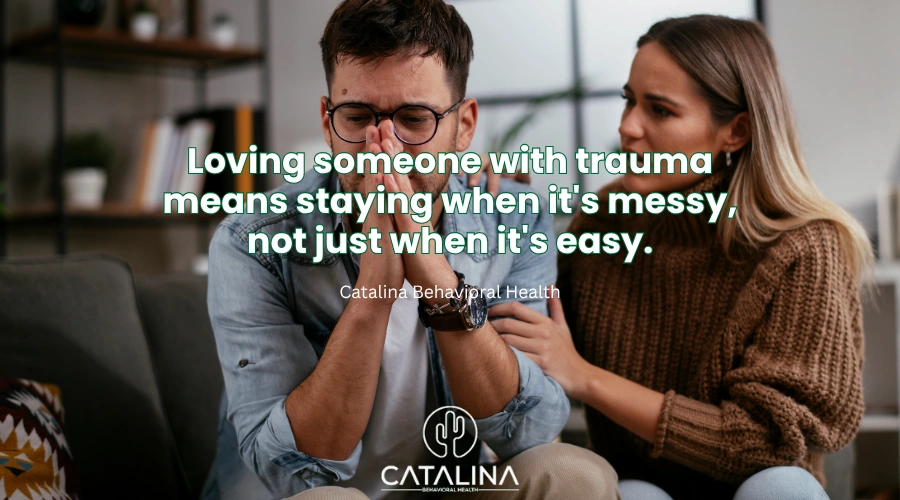Building Healthy Relationships After Experiencing Trauma
Some trauma survivors experience difficulty forming emotional closeness, maintaining boundaries, or sharing their personal space with others. Loved ones may even comment on the significant difference they observe in the person after a traumatic event.
One past client described her trauma as trying to hold a beach ball under the water – every time you think you’ve got it under the water securely, you lose grip and it pops back to the surface. The inability to control the trauma response leaves some considering how to have a healthy relationship after trauma.
Some people with past trauma undergo an innate healing process with time and self-compassion, learning all over again how to communicate effectively and build emotional connections.
But professional treatment, like the therapeutic services provided at Catalina Behavioral Health, can become necessary when the unhealthy patterns of their trauma responses don’t heal naturally.
We invite you to continue reading to learn how trauma affects relationships and how to overcome traumatic experiences.
Get Confidential Trauma and Mental Health Assessment
Understanding the Effects of Trauma on Relationships
Trauma survivors aren’t the only ones impacted. Like our description of the beach ball mentioned earlier, it eventually breaks the surface and splashes everyone in the pool. Trauma disrupts how trauma survivors relate to others. In relationship partners, this can look like:
- Avoidance
- Fear of abandonment
- Fear of intimacy
- Emotional Detachment
- Exaggerated emotional responses
- Hypervigilence
- Reduced communication skills
How much trauma affects the connection between partners depends on the individual’s innate ability to heal and the severity and specific circumstances of the traumatic experience. No two people cope with trauma in the same way.
The Warning Signs of Past Trauma in Your Current Connection

What are some things that indicate trauma is impacting one’s partner? You might notice your partner:
- Has difficult relationships
- Overreacts to minor things
- Expresses a need for reassurance
- Has emotional numbness, even in a once-loving relationship
- Is easily startled
- Avoids trauma triggers
- Experiences anxiety, depression, or sudden mood swings
- Awakens with nightmares
- Experiences flashbacks, intrusive thoughts, or low self-esteem
- Ignores your boundaries
- Has headaches or stomachaches without a medical reason
Whether these come from a recent trauma or go back to childhood abuse, it’s important for your loved one to seek professional help.
How Trauma Can Disrupt Trust and Intimacy
Those who have experienced trauma in the past can make a healthy relationship feel impossible. Trauma survivors often brace themselves for trust or betrayal, even when in an otherwise healthy relationship.
These PTSD behaviors build emotional walls, including defensive behaviors that shut down open and honest communication.
The Role of Therapy in Rebuilding Relationships

A sound relationship houses fulfilling connections and a supportive environment, allowing individuals to grow as individuals and within the relationship. If you’re currently struggling with trauma responses that don’t feel safe, this is an opportunity for personal growth.
But therapy is not only for the trauma survivor; a partner can also benefit from individual or couples counseling to learn healthy ways to rebuild the love based on mutual respect.
Here are some of the skills that partners learn when they work with a therapist or attend a trauma support group:
Establishing Open and Honest Communication
Clear, compassionate communication helps to create compassion and understanding for one another. The trauma response deprioritizes open communication and replaces it with self-preservation. Reopening the channels of communication is key in building healthy relationships after someone has experienced trauma.
Emotional Safety Is Essential for Recovery
Counseling is a place of emotional safety, where people can navigate triggers and work through intense emotions without fear of judgment by their partner or loved ones.
Treatment is particularly important for those working through childhood trauma, where parents never modeled key skills like building trust with others or grounding techniques to stay present and calm.
Get Accredited Treatment Programs at Catalina
Setting Boundaries That Support Growth
Boundaries serve as a way for both partners to avoid falling into harmful past behavior. For trauma survivors, setting boundaries with one’s partner can be a new skill.
They must learn how their trauma responses have harmed their ability to respect others’ boundaries while also mastering how to communicate their own boundaries.
Practicing Emotional Regulation in Daily Life

Trauma survivors often have overwhelming, unpredictable mood swings. Emotional regulation, or learning to notice feelings and respond accordingly, is a skill many in counseling may not have.
Therapy helps build the self-awareness needed to communicate emotions to others without letting the trauma response take control of the conversation.
Building Healthy Conflict Resolution Skills
Disagreements happen in every relationship. But trauma affects relationships in a way that can blow things out of proportion. Conflict feels threatening – or even sometimes dangerous – to the trauma survivor.
They’ve often been prone to surrounding oneself with people who have worsened the trauma, making it hard to feel safe enough to “fight fair.”
Rebuilding Trust After Betrayal or Hurt in the Relationship
What happens if the trauma happened with the current partner? Perhaps there was a past breakup or infidelity. Both partners wish to rebuild the relationship, but the trauma holds one partner back.
Rebuilding trust in the partner takes professional guidance. Learning to open the heart and communicate is the only way to overcome past mistakes.
Celebrating Progress in Your Relationship
Restoring a healthy relationship doesn’t follow a straight line. It can be slow and meander along. A therapist can help you celebrate the small victories.
These can be having productive, honest discussions without arguing or just being there for one another when the trauma feels too hard to bear.
Catalina Can Help Relationships Recover from Traumatic Experiences

If you’re ready to heal the trauma and fix your relationship, Catalina Behavioral Health offers programs that can help both partners.
Here are some evidence-based methods we employ that support growth and healing, though not all clients will receive all forms of care during their time in treatment.
For the Trauma Survivor:
- Trauma-Focused Cognitive Behavioral Therapy (TF-CBT) to identify and reframe negative thoughts and behaviors that can arise after experiencing trauma.
- Eye Movement Desensitization and Reprocessing (EMDR) is an evidence-based technique. It uses bilateral stimulation to help process traumatic memories.
- Somatic Experiencing is a method that focuses on how trauma and its stress is stored in the body and teaches physical techniques to release stress responses.
- Internal Family Systems (IFS) helps clients explore internal “parts” or subpersonalities affected by the experienced trauma, labelling each with a descriptive personality.
- Narrative Therapy encourages the trauma client to rewrite their trauma story in a way that helps support both healing and growth.
- Mindfulness-Based Stress Reduction (MBSR) combines meditation and awareness practices to manage anxiety and internal trauma responses better.
- Dialectical Behavior Therapy (DBT) can be particularly helpful if trauma comes from a place of emotional dysregulation. This science-backed technique helps build tools for distress tolerance, mindfulness, and emotional control.
For the Partner of Someone with Trauma:
- Psychoeducation helps partners understand trauma’s effects and their usual responses. With this information, they can offer the most effective support.
- Individual therapy offers a space for the partner of someone with trauma to explore their own feelings, boundaries, and coping strategies.
- Compassion Fatigue Support shows partners how to care for their loved one without becoming emotionally exhausted by the process.
- Communication skill building helps the partner be more supportive while also avoiding enabling or triggering behaviors.
- Boundary work guides partners in setting and respecting limits to protect the health of both in the relationship.
- Attachment Theory work explores how the partner’s attachment style intersects with the survivor’s trauma. This teaches the person to foster secure, safe attachments.
For the Couple Together:
- Emotionally Focused Therapy (EFT) strengthens emotional bonds in a couple by identifying negative interactions.
- Couples Trauma Therapy combines individual trauma work into couples’ sessions. This very effective method shows the couple how trauma impacts their relationship.
- Narrative Couples Therapy challenges couples to work together, rewriting their shared story. The story should show how past struggles could evolve into a growth-oriented future.
Up To 100% of Rehab Costs Covered By Insurance
Starting Healing from Trauma at Catalina Today
Our trauma treatment programs at Catalina Behavioral Health provide emotional support for you, your family member, or your partner during recovery from traumatic past experiences.
Our certified, licensed therapists and the non-judgmental environment of our accredited mental health treatment center provide a safe space for healing and learning how to rebuild healthy connections in the future.
Are you researching treatment options for yourself or your partner? Call us today for a confidential, free assessment or to learn more about breaking free from past trauma.





